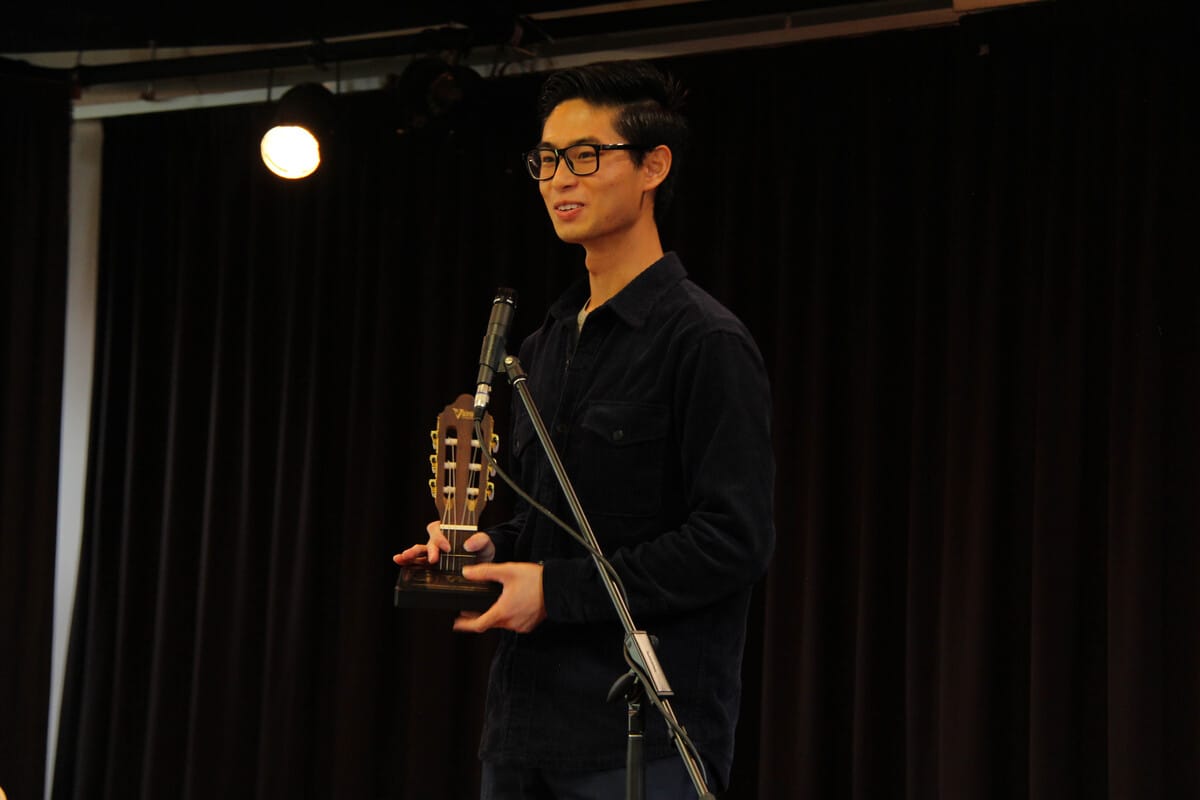
Always meet your heroes. Especially when your hero is Tommy Emmanuel (photo taken by me in 2016)
“Worry about what you can control, not what you can’t control.”
This is the single most important piece of advice given to me by my best friend, and it has shaped the way I handle outside noise.
When I started my teaching career back in 2016, I was terrible at handling criticism and feedback from my parents, friends, other musicians, and experienced entrepreneurs. Anytime someone passed down advice to me, I would take it as a personal attack on my ability as a musician and my integrity as a person. The ironic thing was, whenever someone else wouldn’t take on my advice, I’d be plastered with astonishment. Such was the hypocrite I was.
In January 2016, one of my student’s parents asked me about how I was advertising my school and shared how their piano teacher built their studio by playing at local community groups.
Immediately, I scoffed at her old-school mindset and lamented her lack of understanding of social media and the internet, saying old-school piano teachers like that would eventually fade into oblivion and become another “has-been”.
At the time, I only had 20 students, and my retention rate was a miserly 30%, and that’s being kind to myself.
This was the first of a string of instances where parents would express their concern to me and question my methods, only for me to tear them down and remind them of who the musician was, who the teacher was, and who knew what they were doing.
In August 2016, one parent questioned my method, saying it was not structured, there was no goal-setting, and I needed to be firmer with her son.
I immediately rebutted and told her she was not a musician, so she didn’t know what she was talking about. Fundamentally, while my teaching philosophy has always been centred around “playing good songs”, I failed to put myself in the parent’s shoes and was blind to the fact that parents, ultimately, want the best for their children.
Needless to say, I never saw those two students again.
Even after these two moments, I remained immovable, determined to do things my way, by my own rules, and ignoring every genuinely good piece of advice that others offered. But the tipping point came in September 2016, when I came face-to-face with my all-time hero, Tommy Emmanuel.
At his guitar camp in Sydney that year, I walked in, determined to show my hero just how good I was and how I was going to be the one to lead the next generation of young musicians to carry his legacy forward.
On the first day, as the first class approached, in walked Tommy Emmanuel, the greatest acoustic player since Chet Atkins and a living music legend.
Everyone in the room stood up and gave Tommy the longest-standing ovation I had ever witnessed. To them, they were in awe and felt privileged to be there.
For me, this was no privilege.
This was my destiny and birthright.
I was born to play the guitar, and Tommy was my ticket to greatness.
To my surprise, when Tommy began to speak, he didn’t waffle on about his guitar technique or how many awards he had won.
He started talking about his 4-year-old daughter who he brought to the camp and how he was scrambling to find a baby seat for his rented car earlier that morning. For the next 20 minutes, Tommy gushed over how his daughter had given him a second lease on life after what had been a tough few years. He then played us his latest song “Rachel’s Lullaby”, dedicated to his daughter, a song that, when I look back, was a story about a Daddy and his Daughter.
Everyone was in tears and mesmerized by the humbleness of the song, and I could hear whispers of the Dads in the room talking about their children.
But I was having none of it, and thought I could get away with practicing my guitar in the back of the room, showing how dedicated I was to my craft.
As Tommy explained how he went about his songwriting process, I thought, “I know all this stuff already, let’s get on with it, will you?”
I was the only one in the room who did not care a hair’s breadth about what Tommy was saying until…
As I continued to strum away at my guitar, lost in my own world of self-assurance, I barely noticed the subtle shift in the room’s atmosphere. The once lively chatter dwindled into a hushed murmur, and a palpable tension hung in the air like a heavy fog.
Then, amidst the faint sound of my strings, a voice, commanding yet gentle, cut through the silence like a blade:
“Can you wait?”
The words echoed, reverberating through the room, and sending a shiver down my spine.
In that moment, time seemed to freeze. My fingers, which had danced so confidently across the fretboard just moments ago, now faltered, their movements suddenly stilled. My heart pounded in my chest, the thud of each beat a stark reminder of my vulnerability.
With a sense of dread creeping over me, I slowly lifted my gaze, meeting the stern yet compassionate eyes of Tommy Emmanuel himself. His expression betrayed no hint of anger or malice, only a quiet determination.
As the weight of his gaze bore down on me, I felt a wave of realization wash over me like a sudden downpour. In that brief, electrifying moment, I understood. I understood the gravity of my arrogance, the folly of my pride.
Tommy Emmanuel, my hero, had not just reprimanded me; he had shattered the illusion of invincibility I had so carefully constructed around myself. And in its place, he had left behind a humbled, introspective young man, stripped bare of pretense and ego.
As the guitar maestro resumed his narrative, weaving tales of inspiration and perseverance, I remained rooted to the spot, my mind awash with a tumult of emotions.
Shame, remorse, gratitude — all vied for dominance within me, each one a poignant reminder of the lessons I had yet to learn. In the quiet aftermath of Tommy’s gentle rebuke, I found myself grappling with a newfound sense of clarity. Gone was the arrogance that had once clouded my vision, replaced instead by a profound humility born of humility.
As I trudged back to my hotel room, the weight of Tommy’s rebuke hung heavy on my shoulders.
With each step, my confidence waned, replaced by a gnawing sense of self-doubt. Entering the room, I caught a glimpse of myself in the mirror. The reflection that stared back was not the image of a triumphant musician, but of a young man humbled by his own arrogance.
Disgust surged within me as I beheld the cocky figure glaring back. Until then, I thought I was the next biggest thing.
I believed I knew what I was doing, and everyone needed to listen to me. With a heavy heart, I reached out to my best friend, bracing myself for his inevitable reproach. After all, I deserved it. Instead, his words cut through the silence like a beacon of clarity:
“Worry about what you can control, not what you can’t control.”
Perhaps it was because my hero was the one to tell me off, and that’s why this advice resonated with me so deeply.
This time, I wasn’t going to ignore it. Standing before the mirror once more, I made a silent vow:
“I can control how I behave, how I respect people, and how I treat people. If I do that, I will earn people’s respect.”
Summoning newfound resolve, I ventured into the dining room that evening, head held low, eyes averted. I hoped to evade any mention of the day’s events.
Approaching the buffet table, I exchanged pleasantries with a fellow camper, who was intrigued by my guitar.
As we conversed, he invited me to join his table, introducing me to the group with warmth and camaraderie. Surrounded by newfound friends, doubts gnawed at the edges of my mind. Did they not notice what had transpired earlier, or did they simply not care?
Suddenly, Tommy Emmanuel himself appeared, a beacon of humility and grace.
Despite his legendary status, he approached the table with humility, greeting each person with genuine warmth. In that moment, I was awestruck by his humility. Here was a living guitar legend, asking permission to join a dinner table at his own camp.
As the evening unfolded, I reflected on the events of the day. I had entered the camp with grandiose expectations, only to be humbled by my own hubris.
“Manners are free, they cost you nothing, But if you don’t have manners, they can cost you everything,”
Tommy’s words echoed in my mind, a poignant reminder of the importance of humility and respect.
Looking back on that transformative week, I realized that the lessons learned far exceeded any technical skills acquired.
The brochure promised to elevate my guitar playing, but it was the priceless lessons in humility that left an indelible mark on my soul.
The following week, armed with a newfound perspective, I approached my teaching with humility and openness. When a parent offered constructive feedback, I listened attentively, recognizing the value in their insights. Sharing the story of Tommy’s gentle rebuke became a cornerstone of my teaching philosophy, a reminder to approach criticism with grace and gratitude.
That pivotal moment marked a turning point in my career.
Over the years, I’ve witnessed the transformative power of humility in my students, guiding them on their musical journey with empathy and respect.
As I reflect on my journey, I’m reminded of the profound impact of humility and respect in all aspects of life. Tommy Emmanuel’s wisdom continues to inspire me, serving as a guiding light on the path to growth and self-discovery

